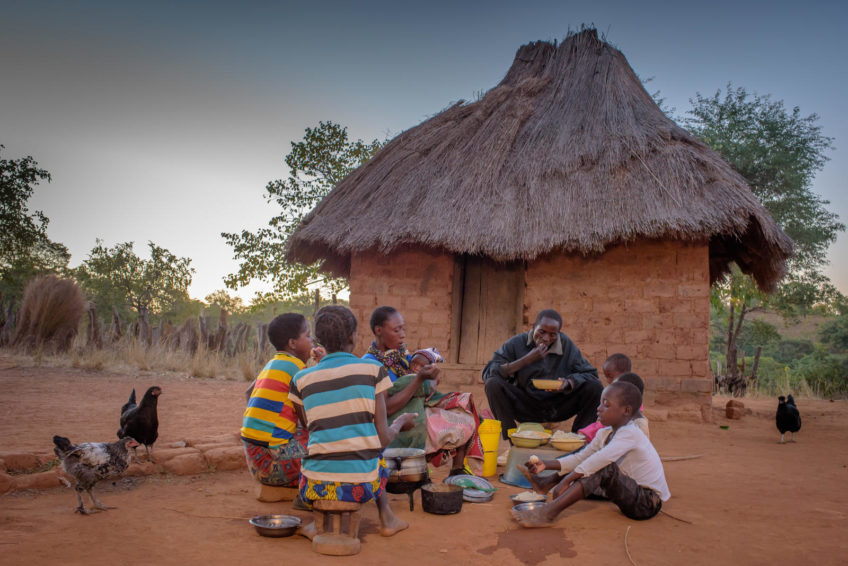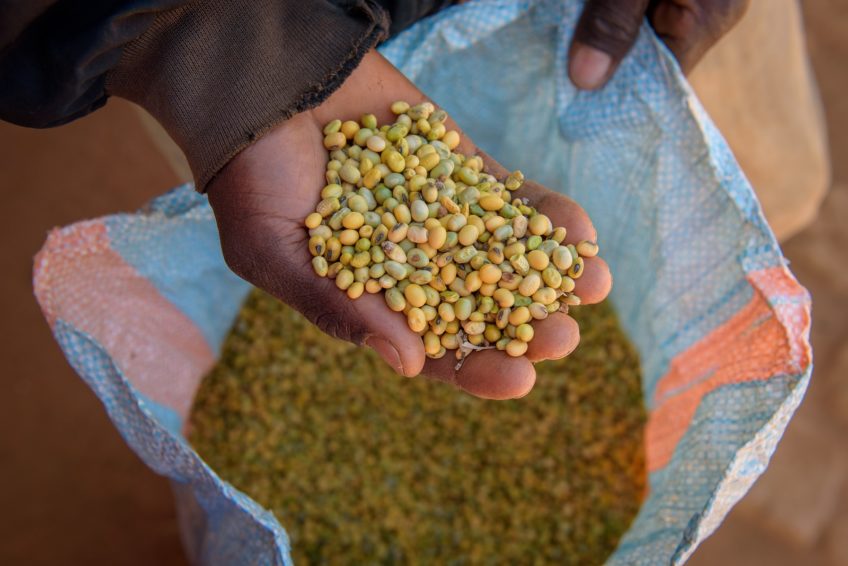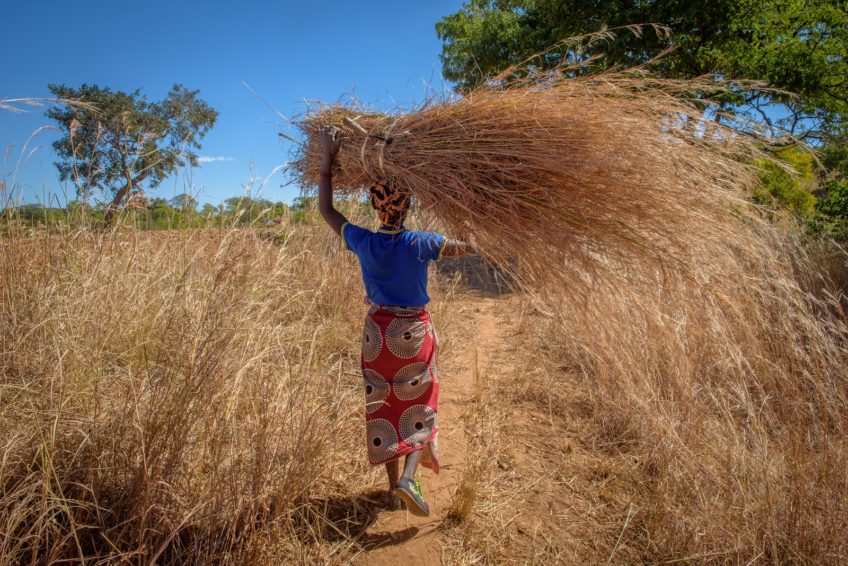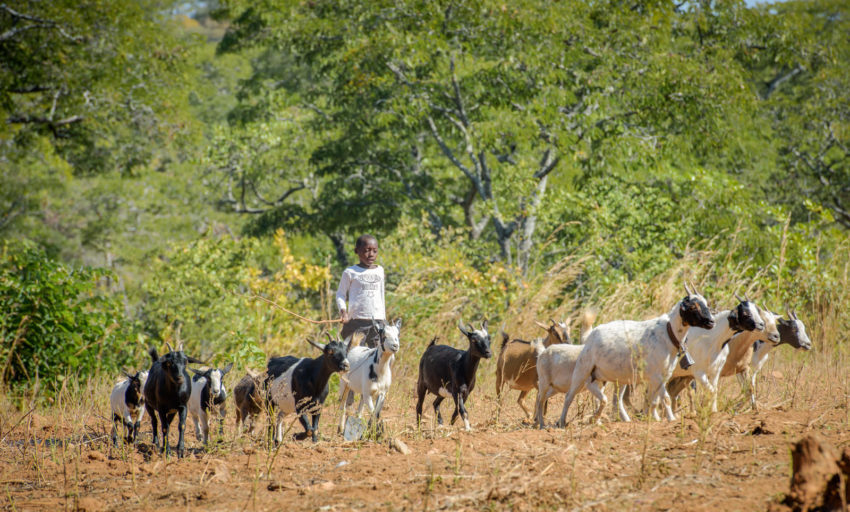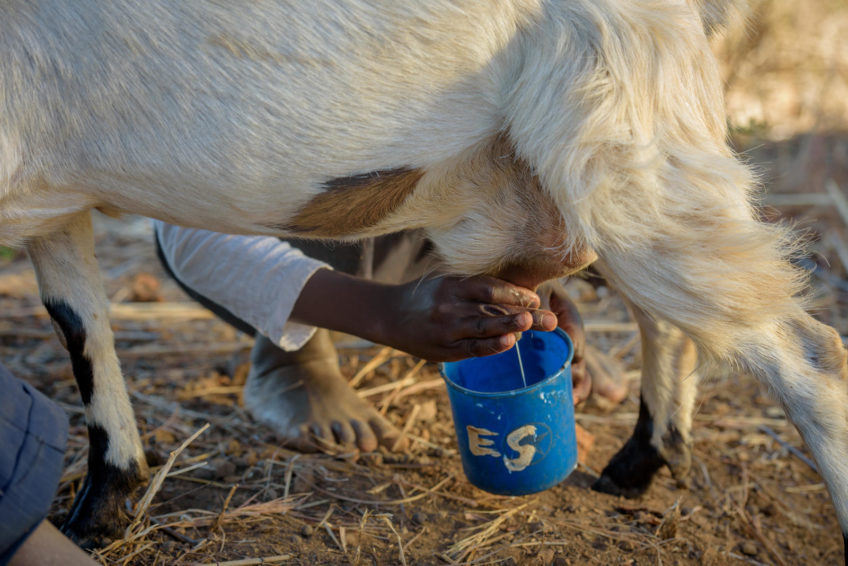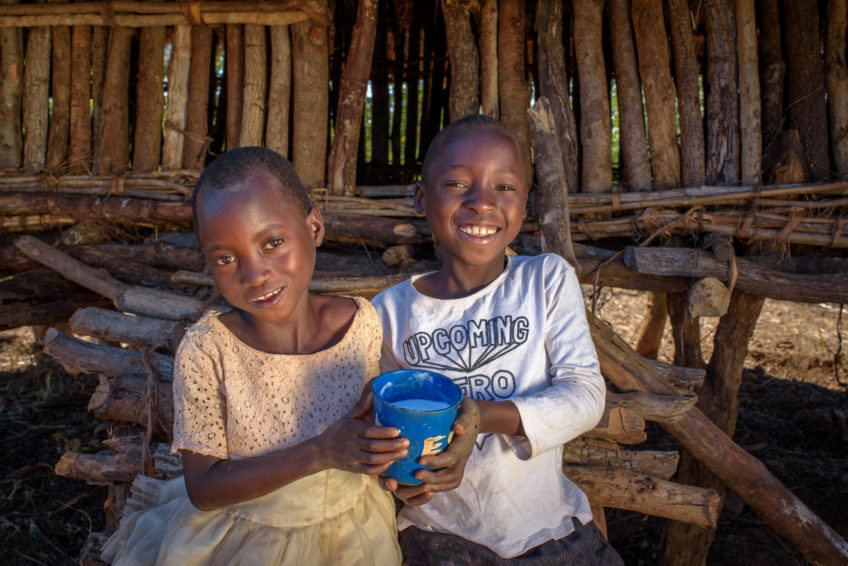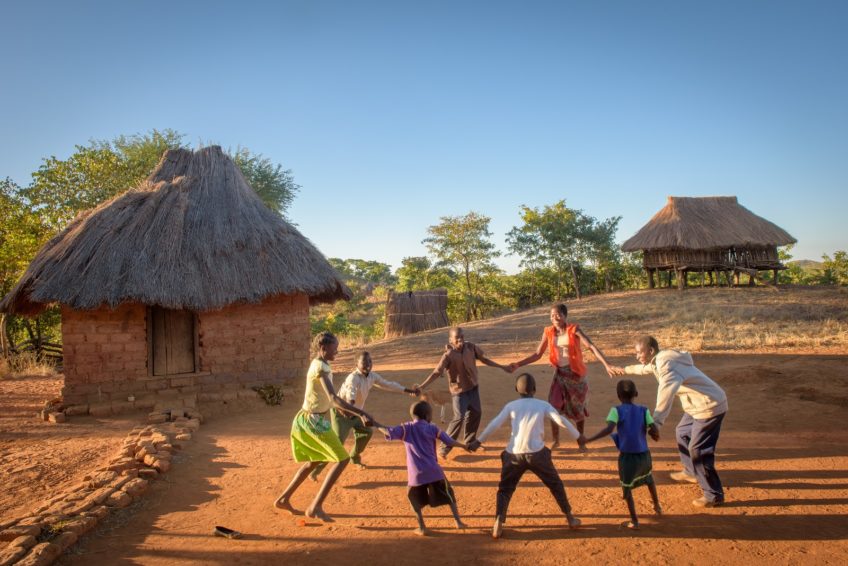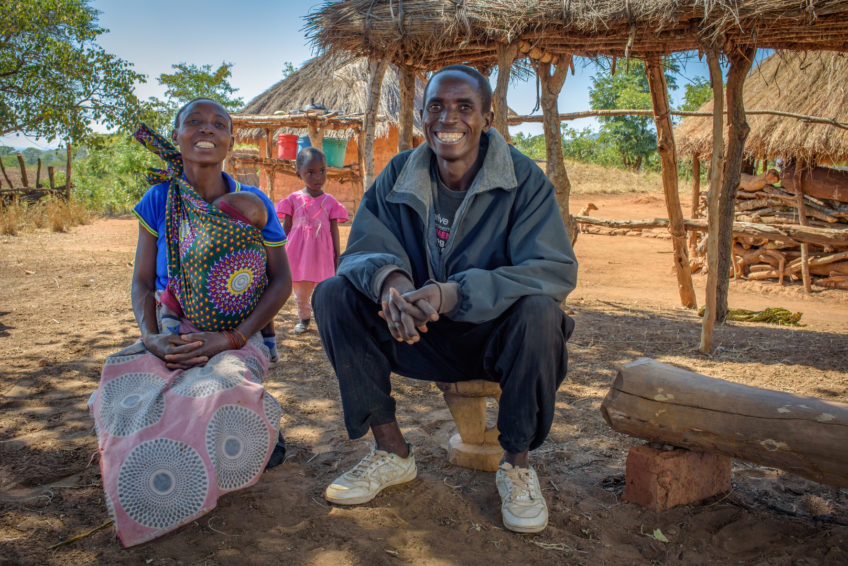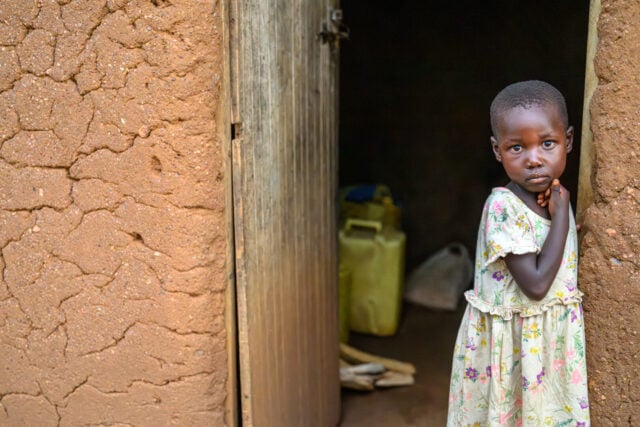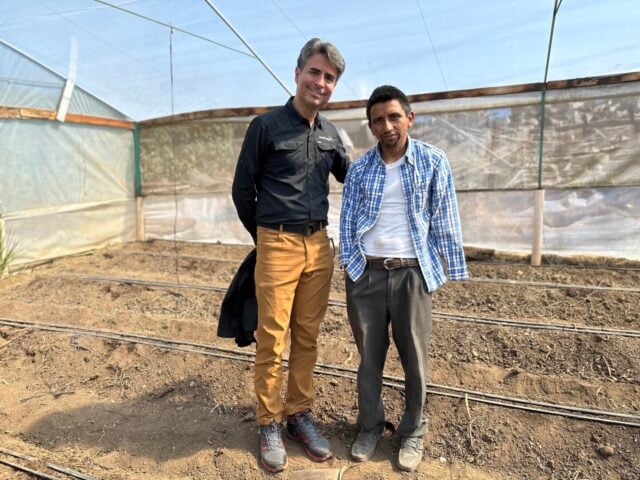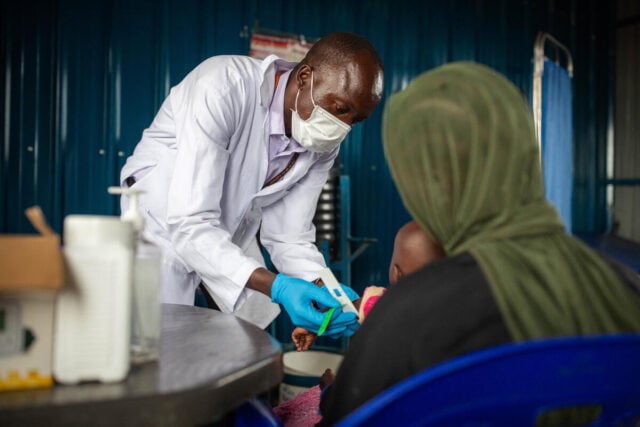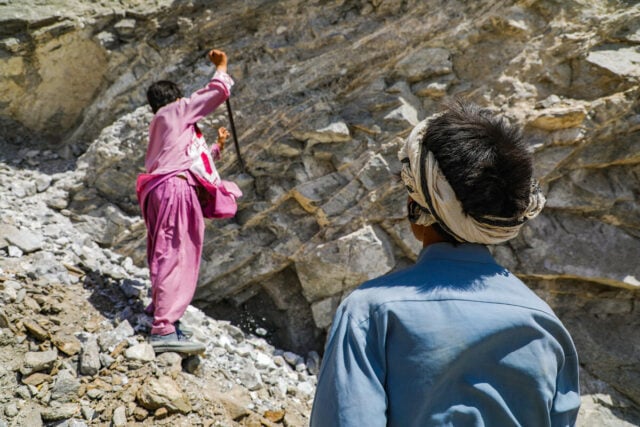With his family’s goats trotting ahead, 9-year-old Nathan Choobwe walks briskly through a field of dead maize stalks in Moyo, Zambia. Although it’s only been a month since harvest time began in April, the stunted corn has been dried up for much longer, says Eunice Siamooya, Nathan’s mother. Maize is the staple food and chief cash crop for many Zambian families, including Eunice, 35, her husband, Diyo, 45, and their seven children. But drought is challenging the ability of these small-scale farmers to feed themselves and make an income.
Rainfall is seasonal in Zambia and usually occurs from early November through March, making this the crucial time to grow crops. For the growing seasons beginning in 2017 and 2018, rains were slow to come and spotty. Without plentiful, timely rain, farmers lost money on their primary rainfed cash crops: maize, soybeans, and cotton.
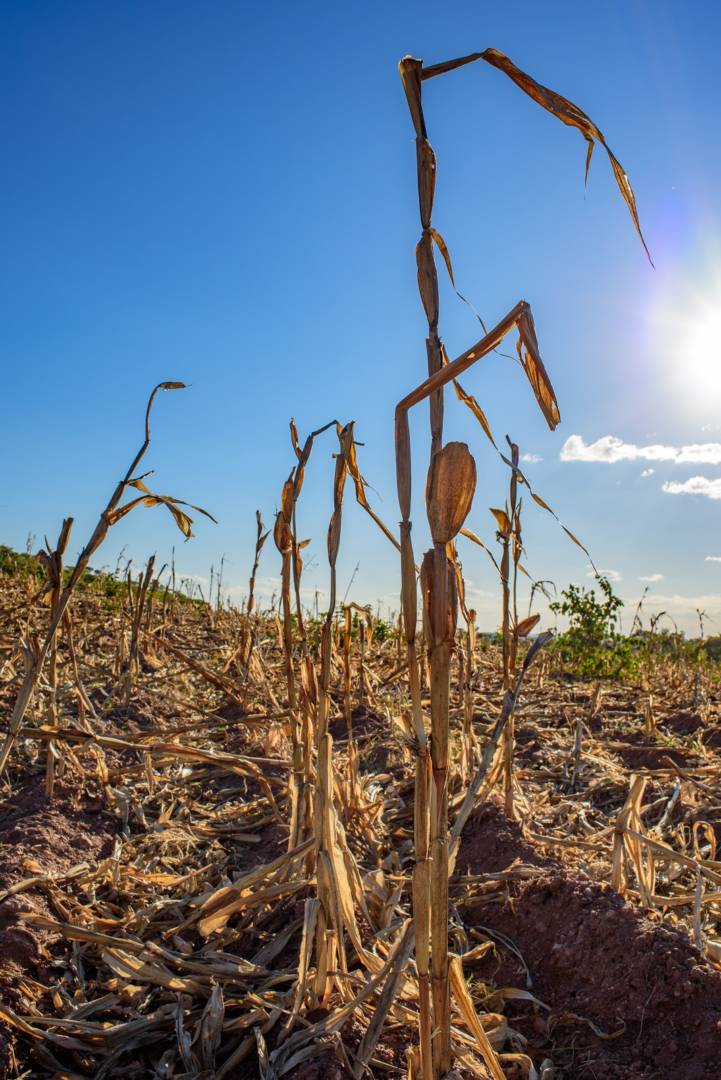
“We planted joyfully,” says Eunice, “but our harvest was poor.” She and Diyo had even hired a neighbor with a team of cattle to plow so they could plant a big field of soybeans. They had seen others be successful with beans and hoped to sell theirs for three times more than they could make from the same amount of maize. But when the rains didn’t come, their crop shriveled. They didn’t produce enough soybeans to be able to both sell and plant again in the next season. Instead, they’ve saved all the seeds from what did grow, and they are determined to try again this next growing season. The maize, which they’d hoped would feed them for many months, has already been eaten.
Times are hard because of the drought, but Eunice and Diyo have seen worse. More than half of Zambians live in extreme poverty, surviving on less than $1.90 a day. Many of them don’t have enough nutritious food. In fact, about 40% of children under age 5 are chronically malnourished. Eunice’s were no exception. When World Vision magazine staff first visited them in 2016, Eunice and Diyo had no way to make an income except to work as day laborers in others’ fields. Sometimes after walking home from an exhausting day’s labor, Eunice would have nothing to cook. It broke her heart to see her children suffering and hear them plead, “We’re hungry. We’re hungry. We want to eat.” All she could do was tell them to “sit, and when night falls, we just go to sleep.”
According to CGIAR, an international research organization focused on food insecurity in developing countries, livestock rearing is the most promising way to scale up food production in Zambia and other countries in sub-Saharan Africa. By raising goats, many farming families in Zambia are beginning to diversify their income so they’re not dependent on rainfed crops. This helps lead to improved economic circumstances, better health, and greater educational opportunities for their children.
For all these reasons, World Vision provides families in need with goats funded through the Gift Catalog, and the community manages our Animal Give-back Program. In 2016 Eunice and Diyo received goats, and it was the beginning of a transformation in their lives and for their children.
Creating hope
World Vision started working in Moyo in 2010 with funding provided by child sponsors. In partnership with the community, World Vision has drilled new wells and repaired broken ones, constructed school latrines and furnished classrooms, and empowered families to improve their livelihoods with better farming methods, saving groups, and livestock rearing.
As an expansion of these efforts, the staff started the Animal Give-back Program, which provides goats to families in need in the community. Each family selected for the program receives four female goats and one male, along with training on how to care for the animals. New goat owners learn how to build a raised goat shed with a slatted floor so the goats stay clean, healthy, and safe at night. They also agree to give back goats to other local families in need when theirs reproduce. This makes the program sustainable, multiplies its benefit, and helps strengthen community collaboration.
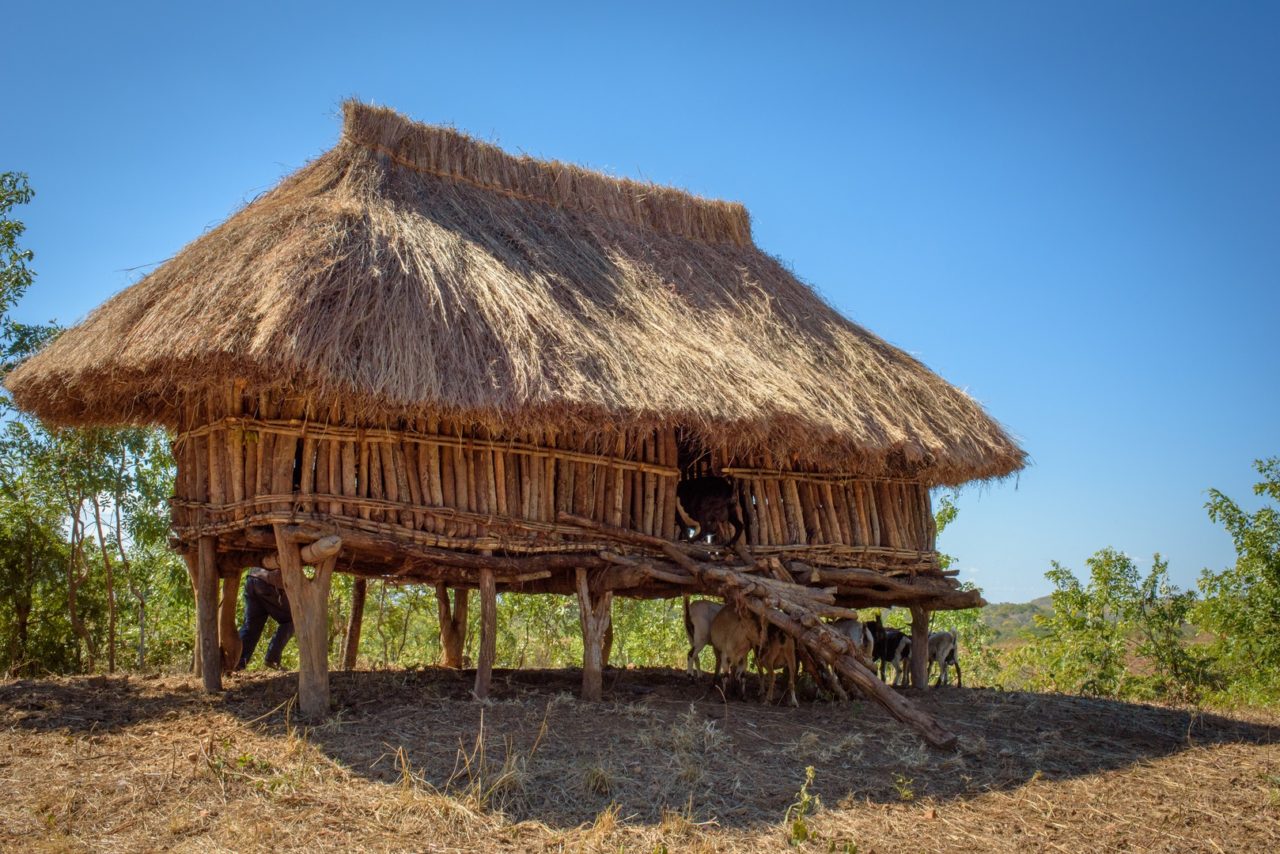
Local leaders, a committee of community volunteers, and representatives of government agencies work with World Vision to ensure the program’s success. The committee interviews families and creates a waiting list of those who qualify to receive give-back goats.
“It’s important for community members to work together and to take ownership in the goat program for it to be a success,” says World Vision staff member Eugern Lubaya Siawala, an agriculture and natural resources expert in Zambia.
In the fall of 2016, Eunice and Diyo received four goats — offspring of goats that another family in the community had received through the World Vision Gift Catalog. As they learned about the training and requirement to give goats back when theirs reproduce, Eunice couldn’t fathom the concept of having enough to give away something so valuable. But Diyo had grown up with goats and knew the potential they held.
“When World Vision gave me goats, I knew I could make good for my family. It was [a] turning point for us,” says Diyo.
Cascading opportunities
From those first four goats they received, Eunice and Diyo’s family now has 20. The goats are now the backbone of their financial stability, says Diyo. They reproduce quickly, they’re easy to raise, and they seldom get sick — but are easy to treat if they do. They support everything. “Goats are like the bank,” Diyo says. “You can always sell one if you need cash.”
Because they have goats to fall back on, he and Eunice see things differently — more optimistically. Before, they saw what they lacked. Now, they delight in making the most of their small resources.
“I sold a chicken and bought fish at the river to dry and bring home. Then I sold the fish and bought two guinea [fowl],” says Diyo, as if recounting a Wall Street triumph.
Now, flocks of chickens and guinea fowl, along with their eggs, are one of the family’s income streams. Eunice explains that because guinea fowl lay lots of eggs for five or six months each year, they’ve been a good investment. When the guinea hens began to lay eggs in the family’s open-air kitchen, Eunice collected and sold them, but always left some so the birds wouldn’t move their nesting place. “We made enough money from selling guinea eggs to buy another goat,” she says.
To increase her return, Eunice placed some of the guinea fowl eggs in a broody chicken’s nest. “Chickens are better mothers than guineas,” she explains. Guinea fowl wander, but chickens stay home and take care of their babies. As she had hoped, the keets (baby guineas) hatched, the chicken raised them as her own.
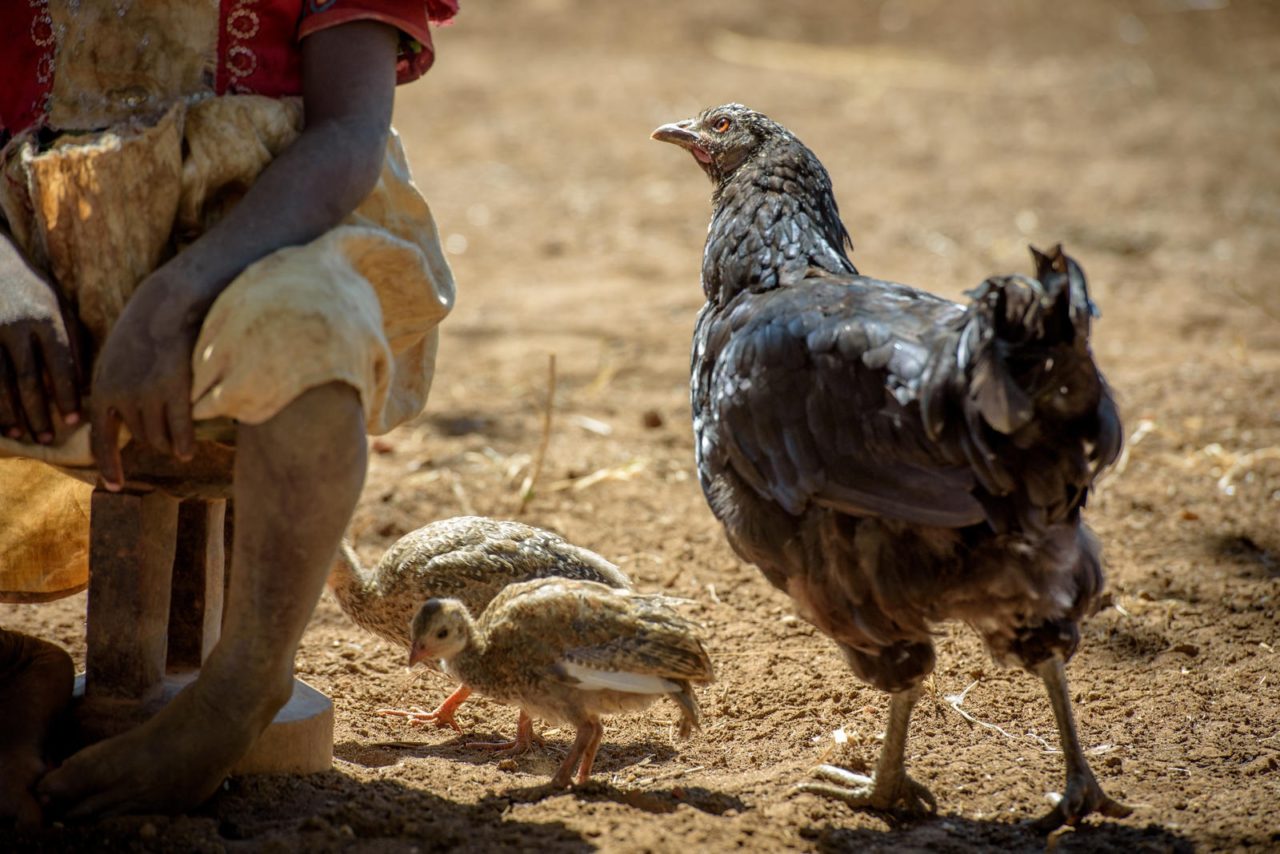
The success with goats is leading to another new opportunity: a vegetable garden alongside Namubbila Creek, about a 15-minute walk from the family’s home. They’re putting a lot of hope, labor, and goat manure fertilizer into this food and moneymaking venture.
Using a short-handled hoe, Diyo rakes manure from under the goat house and scoops it into a bucket. He then mounds the manure around the garden plants to give them a healthy diet of nitrogen, phosphorus, potassium, and micronutrients. The manure makes a good mulch — it’s not stinky and doesn’t attract flies, yet it holds in moisture and improves the soil. And unlike other animals’ waste, it doesn’t need to break down before it can be used as a fertilizer.
Eunice and the children work in the garden every day planting, cultivating, watering, and picking vegetables to eat and sell. Even 5-year-old Chipego carries a bucket to the garden so she can haul water from the creek to nourish the tomatoes, greens, and onions.
This year, there’s much less water in the creek than they’ve ever seen before. Diyo expects it to dry up in a few months, so the gardening is a race against time. They are planting as many vegetables as they can manage, he says, so they can sell some to buy mealie meal (maize flour) for making nshima, a thick, boiled corn-flour porridge they eat at almost every meal.
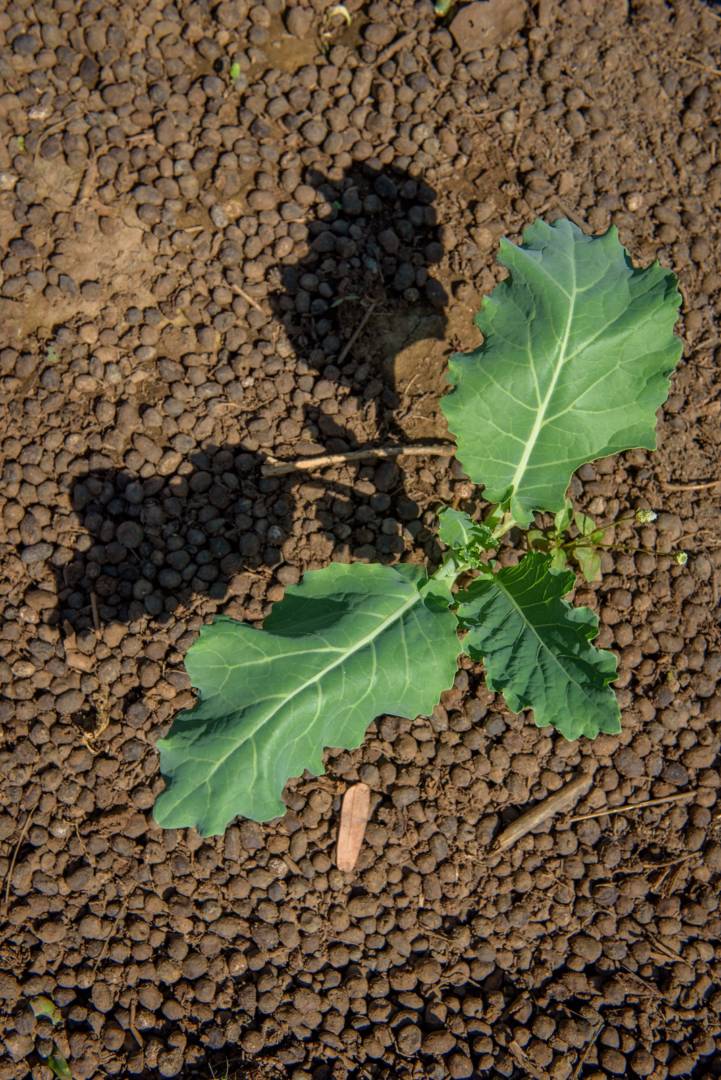
With goats as the major asset of their diversified income streams, Eunice and Diyo are now confident in their ability to cope with the drought, no matter what happens to the garden. Diyo says, “We are so grateful, and our faith is stronger because of the blessings we’ve received through goats.”
Ensuring children’s health
Before they received goats, Eunice and Diyo’s children didn’t have milk, and Eunice was too malnourished to produce breastmilk for her youngest daughter, Messiah, called Messi. At 15 months, Messi cried incessantly because of hunger. Now, she’s a robust 3-year-old who climbs down from her father’s lap to run behind the older kids.
Five-month-old Promise has never lacked for his mother’s milk, says Eunice.
Having their own supply of fresh garden vegetables and plenty of goat milk gives Eunice confidence that her children will never go to bed hungry again. Goats are the mainstay of her family’s health, she says.
“Right now we are just milking two goats, but seven are pregnant,” she says. “Soon, we’ll have lots more milk.”
Nathan is the family’s “goat whisperer.” He lets them out each morning to forage and rounds them up for milking after he comes home from school. “I know a lot about goats because I take care of them,” he says.
Katuba, his favorite, is a big white mother goat who stands patiently while he milks her. When he’s finished, he releases the baby goats from the pen so they can have milk too.
Chipego likes to help by holding the goat’s leg. Then she wants milk while it’s still warm. “If there’s milk, that’s all I want,” she says. “I have it again at night with nshima.”
Eunice and Diyo’s children eat well, drink clean water from a World Vision borehole, and are healthy. They’ve got plenty of energy to do chores and play games after their homework is done. And if someone in the family needs treatment at the Kazimaulu health center, they can sell a goat to cover the cost, ensuring their children continue to grow up strong and healthy.
Preparing for the future
A few years ago, educating their children wasn’t a top priority for Eunice and Diyo, who studied only to sixth and fifth grade respectively. “I could see my children getting married at a tender age,” Eunice says, explaining that she and Diyo couldn’t make enough from odd jobs to pay for school fees.
Eunice credits World Vision for encouraging them to adopt a broader vision of their children’s possibilities and for equipping them with the means to pay for schooling. “If [our kids] are educated, they’ll have more choices later in life,” she says. “They can choose different careers and support each other to achieve.”
Diyo’s take on the value of education is practical: “When we were growing up, our families had food, our parents had livestock. With the drought, it’s harder to make a living now. That makes education more important.”
It’s their goat herd that gives Eunice and Diyo the financial stability to support their children’s education. “Our children know we can send them to school because of the goats,” Eunice says. Trinity, 14, is confident that whenever she and her siblings need school fees, “my father will sell a goat and pay them.” That’s part of the back-to-school process.
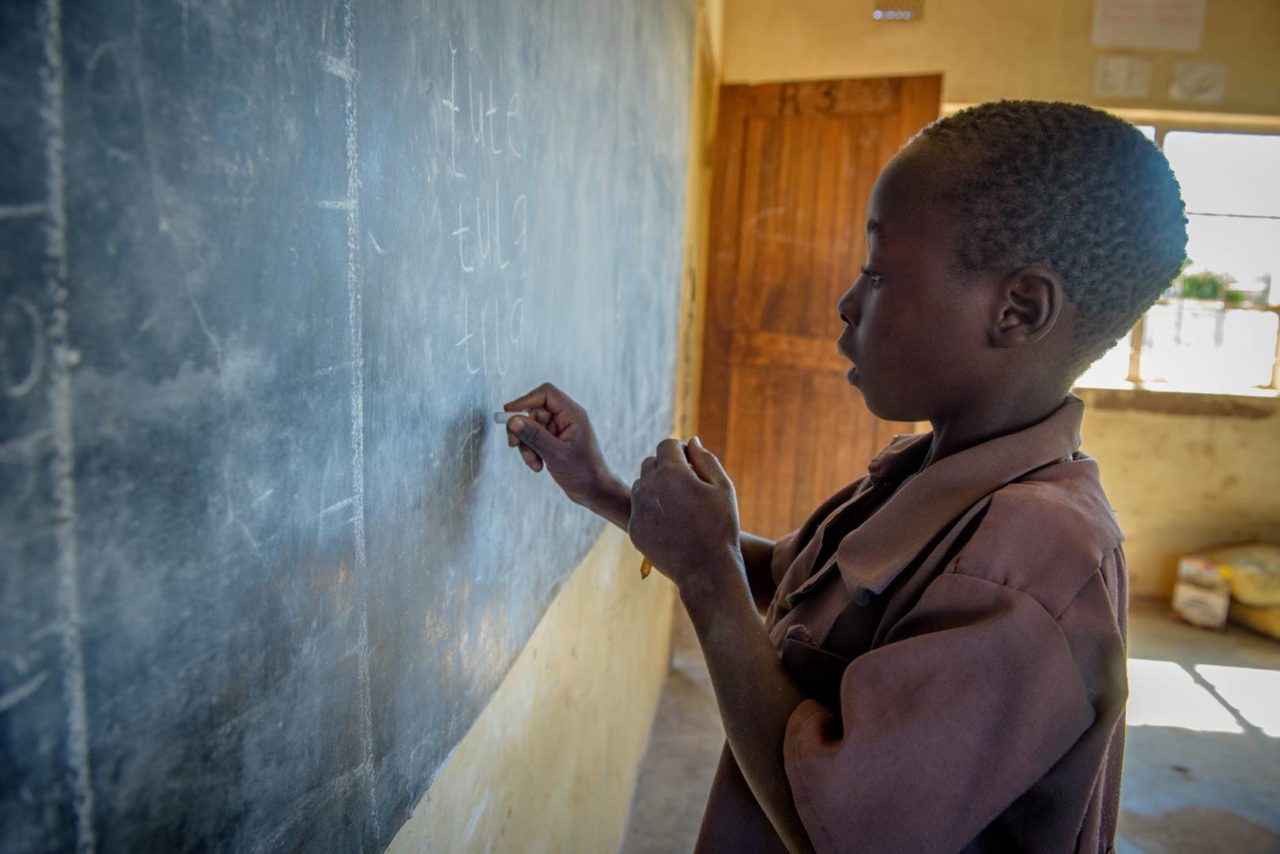
After exams in the most recent school term, Nathan proudly reported to his parents that he’d scored second in his class at Kazimaulu Primary School. He also told them he wants to be a teacher someday. Whatever direction he takes, his mother is convinced that Nathan will be successful. She reviews his schoolwork and reports that there are many more check marks, indicating correct answers, than X’s showing wrong answers.
Nathan’s older sisters attend the same school, and they’ve set the academic bar high for him. Suzia, 15, plans to be a teacher, and Trinity is an aspiring nurse. “I want to help other people, and I want to help my family with money,” Trinity says.
Overflowing blessings
Goats have enabled Eunice and Diyo’s family to be not only resilient in the face of drought, but also generous toward others.
“Before, we had lots of problems, and I felt bad that my family had a difficult life,” Diyo says. “Now I know if I manage our livestock well, we will have enough.”
In 2018, it was their turn to give back goats so that World Vision could help another family in the community start a herd.
“Before we did that, I couldn’t imagine it. But I was so happy that we could do it!” Eunice says. “When we gave the goats, we also shared about the benefits we get from goats, like the manure.”
The giving-back process was a special time for Eunice and Diyo to reflect on the blessings they’ve experienced and to realize the blessing that comes from giving — a deep feeling of peace and joy. What at first had seemed merely an obligation became a source of family pride and solidarity with their community.
“It has strengthened my faith in God to have the opportunity to give,” says Diyo. “God has helped us to increase our goats and other livestock, so it was a blessing to be able to share them as a witness to him.”
Laura Reinhardt of World Vision’s U.S. office contributed to this story.

